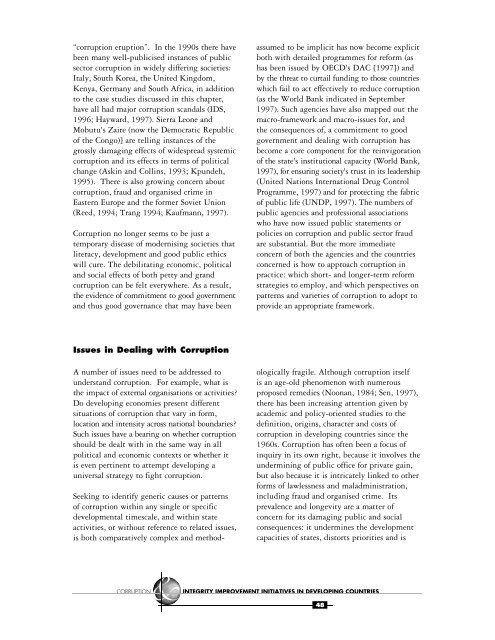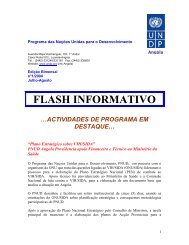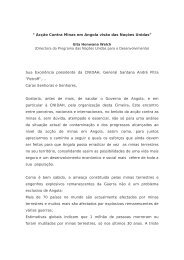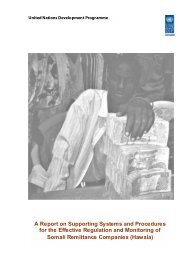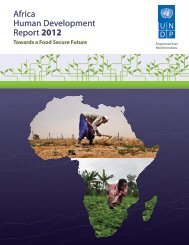CORRUPTION AND ANTI-CORRUPTION STRATEGIES ... - UNDP
CORRUPTION AND ANTI-CORRUPTION STRATEGIES ... - UNDP
CORRUPTION AND ANTI-CORRUPTION STRATEGIES ... - UNDP
Create successful ePaper yourself
Turn your PDF publications into a flip-book with our unique Google optimized e-Paper software.
“corruption eruption”. In the 1990s there have<br />
been many well-publicised instances of public<br />
sector corruption in widely differing societies:<br />
Italy, South Korea, the United Kingdom,<br />
Kenya, Germany and South Africa, in addition<br />
to the case studies discussed in this chapter,<br />
have all had major corruption scandals (IDS,<br />
1996; Hayward, 1997). Sierra Leone and<br />
Mobutu's Zaire (now the Democratic Republic<br />
of the Congo)] are telling instances of the<br />
grossly damaging effects of widespread systemic<br />
corruption and its effects in terms of political<br />
change (Askin and Collins, 1993; Kpundeh,<br />
1995). There is also growing concern about<br />
corruption, fraud and organised crime in<br />
Eastern Europe and the former Soviet Union<br />
(Reed, 1994; Trang 1994; Kaufmann, 1997).<br />
Corruption no longer seems to be just a<br />
temporary disease of modernising societies that<br />
literacy, development and good public ethics<br />
will cure. The debilitating economic, political<br />
and social effects of both petty and grand<br />
corruption can be felt everywhere. As a result,<br />
the evidence of commitment to good government<br />
and thus good governance that may have been<br />
Issues in Dealing with Corruption<br />
A number of issues need to be addressed to<br />
understand corruption. For example, what is<br />
the impact of external organisations or activities?<br />
Do developing economies present different<br />
situations of corruption that vary in form,<br />
location and intensity across national boundaries?<br />
Such issues have a bearing on whether corruption<br />
should be dealt with in the same way in all<br />
political and economic contexts or whether it<br />
is even pertinent to attempt developing a<br />
universal strategy to fight corruption.<br />
Seeking to identify generic causes or patterns<br />
of corruption within any single or specific<br />
developmental timescale, and within state<br />
activities, or without reference to related issues,<br />
is both comparatively complex and method-<br />
assumed to be implicit has now become explicit<br />
both with detailed programmes for reform (as<br />
has been issued by OECD's DAC [1997]) and<br />
by the threat to curtail funding to those countries<br />
which fail to act effectively to reduce corruption<br />
(as the World Bank indicated in September<br />
1997). Such agencies have also mapped out the<br />
macro-framework and macro-issues for, and<br />
the consequences of, a commitment to good<br />
government and dealing with corruption has<br />
become a core component for the reinvigoration<br />
of the state's institutional capacity (World Bank,<br />
1997), for ensuring society's trust in its leadership<br />
(United Nations International Drug Control<br />
Programme, 1997) and for protecting the fabric<br />
of public life (<strong>UNDP</strong>, 1997). The numbers of<br />
public agencies and professional associations<br />
who have now issued public statements or<br />
policies on corruption and public sector fraud<br />
are substantial. But the more immediate<br />
concern of both the agencies and the countries<br />
concerned is how to approach corruption in<br />
practice: which short- and longer-term reform<br />
strategies to employ, and which perspectives on<br />
patterns and varieties of corruption to adopt to<br />
provide an appropriate framework.<br />
ologically fragile. Although corruption itself<br />
is an age-old phenomenon with numerous<br />
proposed remedies (Noonan, 1984; Sen, 1997),<br />
there has been increasing attention given by<br />
academic and policy-oriented studies to the<br />
definition, origins, character and costs of<br />
corruption in developing countries since the<br />
1960s. Corruption has often been a focus of<br />
inquiry in its own right, because it involves the<br />
undermining of public office for private gain,<br />
but also because it is intricately linked to other<br />
forms of lawlessness and maladministration,<br />
including fraud and organised crime. Its<br />
prevalence and longevity are a matter of<br />
concern for its damaging public and social<br />
consequences: it undermines the development<br />
capacities of states, distorts priorities and is<br />
<strong>CORRUPTION</strong>& INTEGRITY IMPROVEMENT INITIATIVES IN DEVELOPING COUNTRIES<br />
4 8


